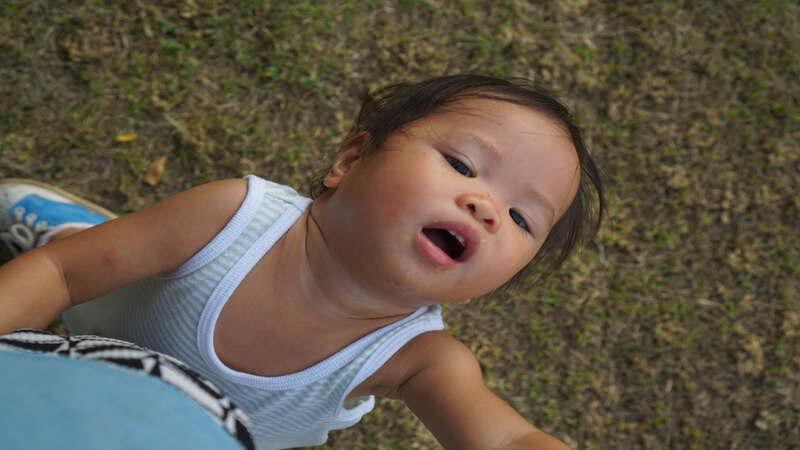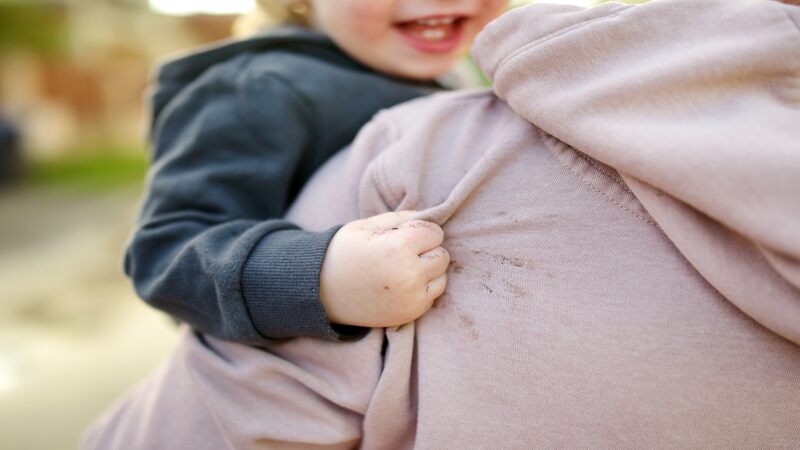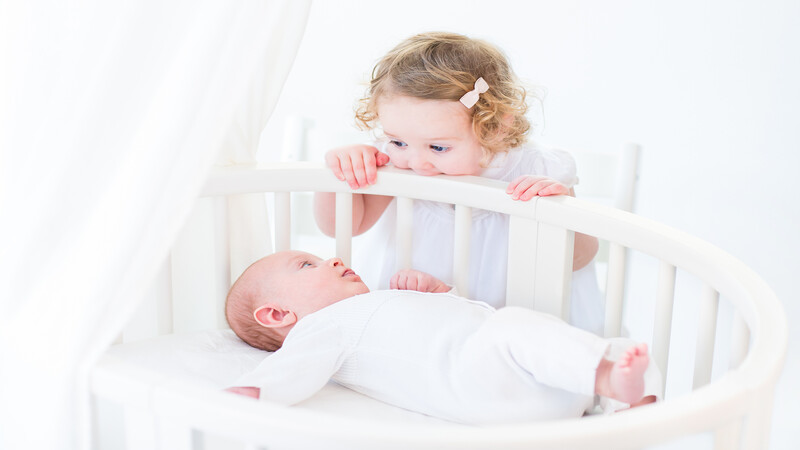
One of the overwhelming challenges of parenthood is coping with a clingy toddler. It is a very common plight watching tiny tots screaming and begging their parents not to leave them behind. Toddler can exhibit clingy and cranky behavior when they feel threatened or unsafe in their immediate surroundings (1).
As this behavior demands physical closeness, your little one may also seek constant emotional reassurance from you. It is vital to know the underlying reasons for such behavior so that practical solutions can be undertaken to make them feel at ease and control their overwhelming emotions.
In This Article
- What is Clinginess in a Toddler?
- What Are The Signs of a Clingy Toddler?
- Why is my Toddler Cranky And Clingy?
- Can Separation Anxiety Cause Clinginess in Toddlers?
- Toddler Clinging After Day Care
- 10 Tips to Cope With a Clingy Toddler
- When Does This Clingy Period End in Toddlers?
- FAQ’s
- References
What is Clinginess in a Toddler?

In toddlers, clinginess is defined as a behavior that is gluey, insecure, anxious, and overly dependent on parents or caregivers. Toddlers who show clingy behavior seek constant physical closeness and cry excessively when left alone. This behavior can also manifest as the toddler following the parent everywhere, becoming cranky and distressed when separated.
Clinginess in toddlers is a common developmental phenomenon (2). It becomes evident due to the toddler’s growing awareness of their surroundings. Moreover, they can easily identify known faces from the unknown. As such, clinginess becomes a medium to seek emotional reassurance and comfort from caregivers they already know.
What Are The Signs of a Clingy Toddler?

One of the first signs of clinginess is when your toddler is overly attached to you and wants you to always be in front of their eyes (3). Sometimes, clingy toddlers may seek constant reassurance and emotional security from a caregiver. The signs of a clingy toddler are as follows:
- Becomes fearful and distressed when separated from the parent
- Get gluey with their parents all the time
- Insists on being carried frequently
- Excessively cries when the parent is out of sight
- Screams or throws tantrums when put down by the caregiver
- Exhibits stranger anxiety (4)
- Avoid playing alone with unknown toddlers
- May constantly check in whether the parent is around
Why is my Toddler Cranky And Clingy?

Clingy behavior in toddlers is rooted in John Bowlby’s attachment theory (5) which states that toddlers have an innate need to feel safe and protected when they sense dangers around. As a result, they become clingy and consider the parent a haven to return for emotional comfort and security.
Some of the other environmental conditions could also make your tot cling to you, begging and crying not to leave them behind:
- Lifestyle Changes: Certain circumstances, such as transiting to their room or teething may affect them emotionally and they look upon you for comfort.
- Family Unrest: Is your family going through emotional turmoil? Do you and your partner quarrel in front of your kiddo? Do you cry or scream in front of them? All these are likely to make your toddler more clingy and demanding of you.
- Unfamiliar Settings And Unknown People: If you have recently shifted to a new house, or locality or visiting someone, then the unfamiliar surroundings may make them feel insecure. They may not be comfortable with the new faces and feel shy (6).
- Sickness: If your toddler is unwell, they seek solace in your arms
- New Baby in The Family: The attention previously given to them is now directed to the new family member. So, the tiny tot feels outcasted and unimportant. Clinging may also be a way of seeking attention (7).
Can Separation Anxiety Cause Clinginess in Toddlers?
Though separation anxiety manifests in a baby when they are still 8-9 months old, it can last well in your baby’s toddler years (8). The fear of losing you, or the stress accompanied by the waiting time for you, makes your toddler cling to you, refusing to let go. Tears, begging, hand-holding, and wails all begin to come into play as your toddler tries their best not to be left behind. Your toddler may not accept any substitute for you, and feel safe and secure only in your presence.
Toddler Clinging After Day Care

Your little one bawling and holding on to you can be an embarrassing and emotionally depressing scenario for you when you drop them at the daycare. And after they return, they don’t want to let you out of their sight (9). This is a stage of separation anxiety. Your toddler has been brave enough to spend time without you in unfamiliar surroundings and company. And when they’re back home, they want to feel secure in your arms again.
Try to enroll in daycares that accommodate more days. This will allow both the caretaker and the toddler to understand each other and adjust well. Your toddler will settle down eventually, just a matter of time.
10 Tips to Cope With a Clingy Toddler

Coping with a clingy toddler may be tricky but not impossible. As parents, try introducing brief periods of separation and assure them you’ll soon return. This helps them to interact with others around them with a sense of trust in you. Some tips to deal with a clingy toddler are given below:
1. Make it Clear That You Will Return Soon
Spell it out clearly to your toddler that you will come back soon. Specify time. Set out work for them >to do such as coloring a page or building a car from Lego blocks. The idea is to increase predictably so that the toddler knows when to expect you next. This will help reduce anxiety and bring a sense of orderliness to the otherwise ‘here and now’ routine.
2. Never Make False Promises
Never tell your tiny tot that you will be waiting outside the daycare or the preschool when you wouldn’t be. Then, even when you intend to fulfill a promise, your toddler will not trust you. False promises are the worst things that you can do to them.
3. Exhibit Bold Body Language
As your little one wails and holds on to you, give them a hug, kiss, or pat on the back. Bend down to them, look into their eyes, and tell them firmly that you will come back soon. Do not linger in the bye-bye process and keep it short. Use a consistent parting phrase and do not over-react to your toddler’s cries and tantrums.
4. Never Sneak Out
Sneaking may make them lose trust in you. Toddlers have the fear that their parents may never return, so sneaking out will only make them more distressed. Have someone around to engage them. Say a short goodbye with an assurance that you’ll be back soon.
5. Spend Exclusive Time With Them
Toddlers feel secure and loved when they hold your undivided attention. A toddler views the mother as a complete package, so make serious efforts to be with them whenever you can. Spending quality time with your tiny tot makes them feel secure and protected (10).
6. Keep Them Engaged
Consider involving your toddler in household tasks with you. Even if it just means holding a potato or keeping away the utensils. Being busy means no trouble for you!
7. Praise The Efforts of Your Kid
Appreciate when your toddler lets you go to buy groceries without creating much of a scene. Praise their conduct and activities performed independently (11). This will improve their confidence.
8. Increase Socialization
Take them to the park or arrange playdates. You can hover around for a while till your toddler gets comfortable playing with other kids and then leave. In this way, toddlers develop attachments to their peers and realize that other toddlers are safe and they can get comfy without moms.
9. Minimize Interruption in Their Play
When your little one is indulging in fun, and gameplay while chatting with imaginary friends, let them be. Imaginary friends act as comforting beings who are there for their support at all times and help build confidence in them (12).
10. Practice Separation
As they grow, let them spend time with other members without your presence. Take them to their grandparent’s place while you can go shopping. You need to instill confidence in them that time spent apart was alright.
When Does This Clingy Period End in Toddlers?

The clinginess in toddlers slowly subsides as they grow older and encounter more unknown spaces around them. Sometimes, exposure to new people in the daycare or preschool can also lead to secure behavior, thereby reducing clingy acts. Clingy behavior peaks around 2 years (13) but diminishes when toddlers attain self-confidence and know how to deal with unknown settings around them.
Coping with a clingy toddler requires patience. Never expect things to change overnight. Since clinginess is a normal developmental phase for their need to stay safe and secure, you should go slow with the coping mechanisms. With consistent encouragement and a slow-paced schedule, you can build their confidence by keeping their trust in you intact.
FAQ’s
1. What Are Some Fun Activities to do With my Clingy Toddler?
Fun activities are the perfect way to build an emotional connection with your tiny tot. You can read interactive books to them, or build castles with dough. At times, exploring nature together or dancing to a music tune can also help to stay connected. The aim is to build a strong bond based on trust and faith.
2. How Can I Encourage my Toddler to Play Alone?
You can encourage your toddler to play alone by introducing short periods of playtime with other toddlers so that they stay engaged and also learn to stay for some time without you. Always offer praise for their efforts so that they feel confident about themselves.
3. What Are Some Strategies For Dealing With Separation Anxiety?
The best way to deal with separation anxiety is by following a short, and consistent goodbye routine. Reassure them with hugs and short assurance that you’ll soon be back. You can also distract them by engaging them in other activities so that they do not get cranky after you leave them alone.
4. What Are Some Ways to Establish a Routine For my Clingy Toddler?
Establishing a routine helps your toddler understand what is expected of them. It makes them feel safe and secure. You can establish meal and nap times, with appropriate times set for outdoor activities. In this way, they will remain engaged and will be less clingy.
5. How Can I Communicate With my Toddler About Their Clinginess in a Positive Way?
You can explain them by using simple words that they can relate to. Avoid scolding or dismissing their feelings. It can make them more cranky. Instead, try offering praise for their efforts and help them engage in activities they like and can spend time alone.
6. How Can I Help my Toddler Become More Independent?
You can allow them to dress up on their own or eat without you. Moreover, appreciate them by hugging them or saying kind words. These will grow their self-confidence and they’ll feel self-assured. The more positively they feel about their worth, the less clingy they’ll become.
References
- Scholtes-Spang, Kerstin & Benz, Marisa. (2016). Developmentally Appropriate and Excessive Clinginess. 10.1007/978-3-319-43556-5_6. – https://www.researchgate.net/publication/311897578_Developmentally_Appropriate_and_Excessive_Clinginess#
- Medically reviewed by Mia Armstrong, MD — Written by Jayne Leonard on June 7, 2021 – https://www.medicalnewstoday.com/articles/separation-anxiety-in-babies#
- National Childbirth Trust – https://www.nct.org.uk/baby-toddler/toddler-tantrums-and-tricky-behaviour/clingy-babies-and-separation-anxiety-how-cope#
- Tsola, ME., Anastassiou-Hadjicharalambous, X. (2011). Stranger Anxiety. In: Goldstein, S., Naglieri, J.A. (eds) Encyclopedia of Child Behavior and Development. Springer, Boston, MA. https://doi.org/10.1007/978-0-387-79061-9_2811 – https://link.springer.com/referenceworkentry/10.1007/978-0-387-79061-9_2811#
- Granqvist, P., & Duschinsky, R. (2021, August 31). Attachment Theory and Research. Oxford Research Encyclopedia of Psychology. Retrieved 24 Jun. 2024, from – https://oxfordre.com/psychology/display/10.1093/acrefore/9780190236557.001.0001/acrefore-9780190236557-e-51?p=emailAS5FGMW2o.5yU&d=/10.1093/acrefore/9780190236557.001.0001/acrefore-9780190236557-e-51#
- Van Hulle CA, Moore MN, Lemery-Chalfant K, Goldsmith HH, Brooker RJ. Infant stranger fear trajectories predict anxious behaviors and diurnal cortisol rhythm during childhood. Dev Psychopathol. 2017 Aug;29(3):1119-1130. doi: 10.1017/S0954579417000311. Epub 2017 Mar 20. PMID: 28318454; PMCID: PMC5509479. – https://www.ncbi.nlm.nih.gov/pmc/articles/PMC5509479/
- Bosmans G, Braet C, Heylen J, De Raedt R. Children’s Attentional Processing of Mother and Proximity Seeking. PLoS One. 2015 Apr 30;10(4):e0124038. doi: 10.1371/journal.pone.0124038. PMID: 25927921; PMCID: PMC4415806. – https://www.ncbi.nlm.nih.gov/pmc/articles/PMC4415806/
- Feriante J, Torrico TJ, Bernstein B. Separation Anxiety Disorder. [Updated 2023 Feb 26]. In: StatPearls [Internet]. Treasure Island (FL): StatPearls Publishing; 2024 Jan – https://www.ncbi.nlm.nih.gov/books/NBK560793/
- Datler W, Ereky-Stevens K, Hover-Reisner N, Malmberg LE. Toddlers’ transition to out-of-home day care: settling into a new care environment. Infant Behav Dev. 2012 Jun;35(3):439-51. doi: 10.1016/j.infbeh.2012.02.007. Epub 2012 Jun 19. PMID: 22721743; PMCID: PMC3425770. – https://www.ncbi.nlm.nih.gov/pmc/articles/PMC3425770/
- Li D, Guo X. The effect of the time parents spend with children on children’s well-being. Front Psychol. 2023 Apr 3;14:1096128. doi: 10.3389/fpsyg.2023.1096128. PMID: 37077856; PMCID: PMC10106685. – https://www.ncbi.nlm.nih.gov/pmc/articles/PMC10106685/
- Gunderson EA, Gripshover SJ, Romero C, Dweck CS, Goldin-Meadow S, Levine SC. Parent praise to 1- to 3-year-olds predicts children’s motivational frameworks 5 years later. Child Dev. 2013 Sep-Oct;84(5):1526-41. doi: 10.1111/cdev.12064. Epub 2013 Feb 11. PMID: 23397904; PMCID: PMC3655123. – https://www.ncbi.nlm.nih.gov/pmc/articles/PMC3655123/
- The Childrens Mom Docs, Shobha Bhaskar, M.D., pediatric hospitalist with St. Louis Children’s Hospital and Washington University School of Medicine – https://childrensmd.org/browse-by-topic/parenting/toddlers-and-imaginary-friends/
- Advanced Psychology Services, Dr. Tali Shenfield, PhD in Psychology from the University of Toronto | January 27, 2023 – https://www.psy-ed.com/wpblog/clinginess-in-children/
